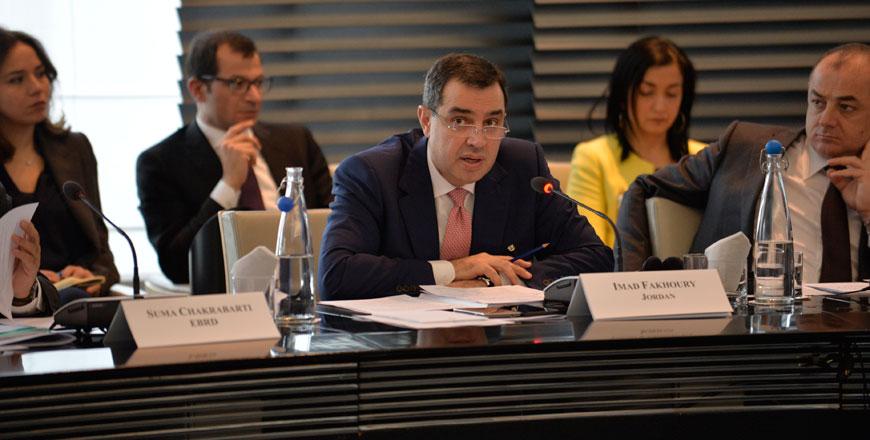You are here
Jordan targeted by EBRD investment expansion plan
By Omar Obeidat - May 23,2015 - Last updated at May 23,2015
DEAD SEA –– The European Bank for Reconstruction and Development (EBRD) plans to increase its investments in Jordan by channelling hundreds of millions of euros in the coming years, the bank's chief said.
EBRD President Sir Suma Chakrabarti said a request will be presented to the board of directors of the bank to approve around one billion euros in new investments for the southern and eastern Mediterranean region, which includes Jordan, Egypt, Morocco and Tunisia, adding a fair share of these investments will be directed to strategic sectors in the Kingdom.
Chakrabarti made the remarks during an interview with The Jordan Times on Friday on the sidelines of the World Economic Forum on the Middle East and North Africa, which concluded Saturday.
EBRD began investing in Jordan in September 2012 and their investments, up to date, are valued at 337 million euros, he added.
The EBRD chief praised the long-term vision Jordan has recently launched to improve the performance of the economy, adding it sends positive messages to investors that the Kingdom has consistent policies.
Although Jordan is surrounded by countries witnessing violence, Chakrabarti said the Kingdom still has the potential to market itself to international investors as an "oasis of calm in a troubled region", explaining that the government, the private sector and investors working in the country, including the EBRD, should cooperate to present to others the uniqueness of Jordan in the region.
"Foreign investors out there who do not know the region well should know that Jordan is different. It is stable, secure and enjoys good economic policies. Jordan should not be defined by regional chaos," he said.
The EBRD chief, who was a panellist at a session titled “Jordan Relaunched: Advancing Growth and Development", said international agencies and private investors should also work on helping Jordan deal with the refugee influx from Syria.
"Around 20 per cent of Jordan's population now is refugees; we all need to try to help integrate refugees into the economy to give them opportunities to contribute to the Jordanian economy," he added.
Chakrabarti urged policy makers in Jordan to work on marketing investment plans by trying to attract wealth funds in the Gulf region to bring in long-term capital, indicating that sovereign funds would be interested in development outcome of the country but also want to see financial return and profits for their projects.
"Jordan should use opportunities like the WEF to market itself to sovereign funds and global investors," he said, adding the reason why sovereign funds are shy in their investments in the region is sometimes because of the small size of the economies, so it wouldn’t be feasible. The EBRD chief added that at other times, the political situation in these countries is very difficult or never certain.
Related Articles
Sir Suma Chakrabarti, president of the European Bank for Reconstruction and Development (EBRD) is due to arrive in Amman on Thursday for an official visit to Jordan ahead of his participation in the World Economic Forum (WEF) on the Middle East and North Africa.
AMMAN — Jordan is working on an approach to turn the refugee crisis into a development opportunity, Planning and International Cooperation M
The European Bank for Reconstruction and Development (EBRD) voted here Thursday in favour of Libya becoming a member country, a move that could see it eventually receive EBRD financing.












